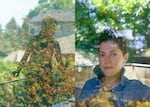
Sasha Mallett, at her Portland home, Aug. 3, 2021. Mallett has a severe immunodeficiency. Her life changed significantly as a result of the pandemic, but she says “I’m pretty sure I’ve discovered the meaning of life and I’m pretty sure it can be summed up in one word: relationships.”
Kristyna Wentz-Graff / OPB
Lives Changed is an OPB series looking at how people’s lives have changed across the Pacific Northwest during the COVID-19 pandemic.
Before the pandemic, Sasha Mallett pretty much had a normal, busy life as a primary care doctor in Portland.
“I would go into work every day and see patients all day long and come home,” Mallett said. “I would spend time with my son. My husband and I had a standing Monday night date night; we would go out to a restaurant every Monday night. And I would consider myself a bit of a socialite; I had a lot of friends.”
But at the beginning of 2020, Mallett wasn’t exactly carefree. She was watching closely as COVID-19 cases began to pop up in the Seattle area in January and February.
The day the first case of COVID-19 was found in Oregon is burned into her mind: Feb. 28, 2020.
Mallett says she came home from a full day of seeing patients when she opened her phone and saw a news story that upended her life: COVID-19 had been detected in a Lake Oswego school — and the patient was being treated at a hospital that is part of the large health organization where she worked.
“It was one of those sort of cinematic moments where your whole focus telescopes around this new piece of information,” she says. “I realized in that instant that my life was about to totally change — and that I wasn’t going to work on Monday.” This was weeks before most of us were even considering the possibility of working from home.
But there’s a good reason she was tuned in so early.

Sasha Mallett at her Portland home, Aug. 3, 2021. Mallett has a severe immunodeficiency. Her life changed significantly as a result of the pandemic, but she says “I’m pretty sure I’ve discovered the meaning of life and I’m pretty sure it can be summed up in one word: relationships.”
Kristyna Wentz-Graff / OPB
Mallett has CVID, which stands for common variable immunodeficiency. It’s a relatively rare but severe problem with a person’s immune system that prevents them from making functional antibodies. That puts her at risk of recurrent infections that her body has a hard time fighting off. And of course, a person’s immune system is how their body responds to vaccines. Scientists don’t yet know how strong of an immune response patients with CVID will have to COVID-19 vaccines.
But Mallett has a severe form of CVID, so she felt like for her, the COVID-19 vaccine wasn’t an option.
“I rely on things like herd immunity masks, social distancing and ultimately just some luck for my protection,” she said. “I think if you made a list of diseases to not have during a pandemic, I think CVID might be somewhere near the top.”
That evening, Mallett and her husband had to sit down and figure out how to drastically rearrange their lives. They wrote an email to all of their friends and family, basically saying, hey: for the foreseeable future, we’re not letting anyone into our house. We’re not going to any restaurants. We’re only going to be hanging out outside with people.
“We used words like ‘social distancing,’” Mallett said, “which, I remember at the time, the term was something that no one had even heard of; it wasn’t part of our vernacular. And the response I got from that was people being like ‘whoa, calm down: this will pass, this is this is a blip in the road, no reason to totally reorient and restructure your life!’”
“It did feel like there was this lag. I think everyone references the middle of March when schools shut down, but we were in it by that point. We had already totally changed everything.”
Overnight, Mallett and her family began a perpetual lockdown. She became her healthcare organization’s first full-time virtual primary care doctor. Luckily that transition was relatively smooth: she’d already been doing some telehealth before the pandemic and found she could still carry out most of her work over the computer.
The early months of the pandemic had a surprising equalizing effect for her. Suddenly, her patients were asking her about the same things she’d had to worry about every day.
“People would come to me and say, ‘oh my gosh, I’m really scared that there’s this thing lurking out there in the ether that might make me sick,’” Mallett said, “and I was like, ‘yeah, welcome to the club! This is where I have been for the last several years of my life.’ I felt like I was the docent in this really weird fear-space, where these things that used to set me apart from other people prior to the pandemic, we were now sort of on the same page with.”
But as the months wore on, and the pandemic worsened, Mallett realized she wasn’t going back to face-to-face visits anytime soon. She had to eventually acknowledge a difficult truth: that she may never go back. For someone who got into medicine because she genuinely loved people and wanted to help them, this was especially tough.
“I remember, several months into the pandemic, I had my stethoscope just sitting in my room and at one point I said ‘I should just put this away,’” she says. “That was a really sad moment, knowing that I’m potentially never going to use it again, which is this kind of defining feature of being a doctor: using a stethoscope and wearing a white coat, something I did every day.”
This summer, as vaccines became widely available and many people began to come out of a year of lockdown, Mallett stayed home. She still felt like the docent in this weird, new world, but she realized that she was a permanent member here: everyone else was just a temporary visitor. The equalizing effect of a global pandemic was gone.
“For a lot of us who are immunocompromised or even just high-risk, living during Covid and watching things open up was sort of salt in the wound,” she said. “It was very scary and sad at the beginning of the pandemic, and obviously I felt my own life was in danger; people I loved, their lives were in danger. But then when things started to relax and open up it was sort of like: ‘Oh, right. I’m still in that space and yet, everyone else around me gets to relax a little bit.’”
Even for someone like Mallett, with a loving family and friends, being immunocompromised during this pandemic has been extremely isolating. She says she doesn’t know many other people who are in the same situation as she is: she says there’s no big welcoming party where someone greets you and introduces you to all the people who are immunocompromised in your neighborhood.
“I think one of the things that happened during this pandemic,” she said, “is that it’s really drawn this distinction between feeling loneliness and feeling alone. I feel lucky that I haven’t felt lonely during this pandemic; I feel surrounded by people even if it’s not their physical presence. But I do feel alone. I think that aloneness is one of the central tenets of a trauma; this idea that something is traumatic because we experience it as something that we’ve had to bear on our own.”
This pandemic has been genuinely traumatic for all of us. Some of us have experienced it in small ways; others are dealing with nearly unbearable grief. But Mallett said that trauma doesn’t need to define our everyday lives. For her, the experience has had the flipside of giving her a greater appreciation for what she does have in life and what matters.
“I feel grateful right now that there is even a greater societal understanding of disease transmission,” she said. “I think for the rest of my life as someone who’s immunocompromised forever, there will be this appreciation of how diseases get transmitted. We will all think about coming to work sick differently from here on forward.”
But she’s also careful not to paint too rosy of a picture: that gratitude doesn’t mean life is on easy street. Not by a long shot.
“Gratitude always goes hand in hand with suffering,” she said. “I think they’re inexplicably linked and where there has been suffering there often comes gratitude, and gratitude is often born out of suffering. I think gratitude and suffering are not a zero-sum game. They will always co-exist together, but gratitude is never going to make up for the suffering that has transpired.”
There are millions of immunocompromised adults in the US. But Mallett is fighting back against that feeling of being alone: today, she’s building a support group with other immunocompromised people in the region. She’s asking people to reach out at www.sashamallett.com.
Listen to Sasha Mallett’s full story using the audio player above
Editor’s note: We’ve updated this story to clarify the scientific understanding of how people with CVID, or common variable immunodeficiency, respond to vaccines.
